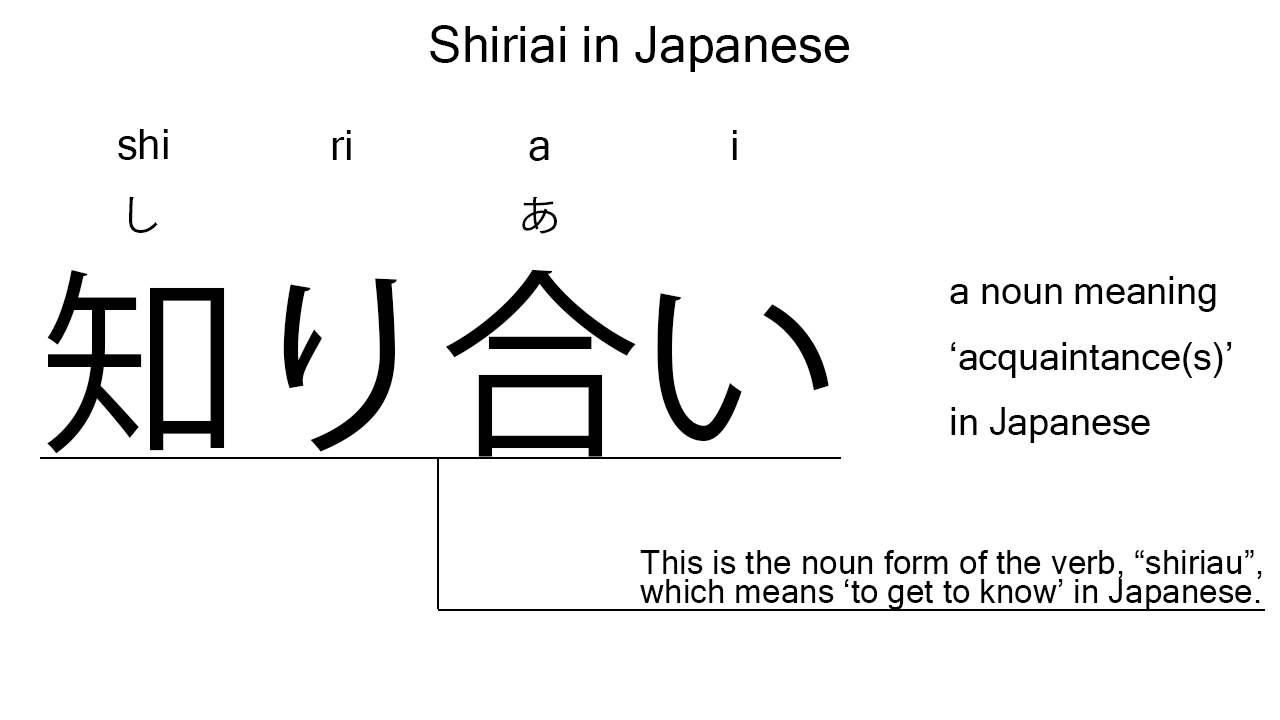What does “shiriai” mean in Japanese?
Native speakers say “shiriai” to mean ‘acquaintance’ in Japanese. Perhaps, some Japanese learners know this word as it is sometimes used in Japanese conversations. In this blog post, however, I will explain it in detail together with its grammatical background. And also, I will explain how to use it through example sentences. My explanations would help Japanese learners understand “shiriai” more clearly. Then, let’s get started!
Contents
Definition and meaning of “shiriai”
Let me start with the definition and meaning of “shiriai”.
- shiriai – 知り合い (しりあい) : a noun meaning ‘acquaintance’ in Japanese. This can also work as plural. Learn more about Japanese plural.
Japanese native speakers use this noun to refer to someone they have met before, but who is not a friend.
The definition and meaning are simple and clear. To understand this noun more clearly, however, let me explain its grammatical background in detail.
What does “shiriai” literally mean in Japanese?
“Shiriai” is considered as the noun form of the following verb:
- shiriau – 知り合う (しりあう) : a verb meaning ‘to get to know (each other)’ in Japanese.
So, the noun form, “shiriai”, literally means ‘getting to know (each other)’ in Japanese. This literal interpretation is not completely in line with the actual meaning, but still understandable, I think. Acquaintances are often people we’ve got to know before.

When we meet new Japanese words, we should check their grammatical backgrounds in detail to understand their meanings clearly and deeply. In many cases, backgrounds tell us a lot about the meanings of the words to which they are grammatically related. Actually, here, we could get the better understanding of “shiriai” through the detailed check above.
So far, I’ve explained the definition and meaning of “shiriai” together with its grammatical background. Then, let me explain how to use it through the example sentences below.
Example #1: how to say “acquaintance” in Japanese
kanojo wa boku no shiriai desu – 彼女は僕の知り合いです (かのじょはぼくのしりあいです)
She is my acquaintance.
Below are the new words used in the example sentence.
- kanojo – 彼女 (かのじょ) : a pronoun meaning ‘she’ in Japanese.
- wa – は : a binding particle working as a case marker or topic marker. In the example, this works after “kanojo” to make the subject in the sentence.
- boku – 僕 (ぼく) : a pronoun meaning ‘I’ in Japanese. This is used mainly by boys and young males.
- no – の : a case particle used after a noun or pronoun to make its possessive case. In the example, this is used after “boku” to make its possessive case, “boku no”, which means ‘my’ in Japanese.
- desu – です : an auxiliary verb used after a noun or adjective to make it polite. Probably, this is well known as a part of Japanese desu form. In the example, this is used after “boku no shiriai” to make it sound polite.
This is a typical usage of “shiriai”. In this example, it works together with the possessive case, “boku no”, to mean ‘my acquaintance’ in Japanese.
Example #2: another usage of “shiriai”
watashi wa kinou shiriai ni at ta – 私は昨日知り合いに会った (わたしはきのうしりあいにあった)
Yesterday, I met an acquaintance.
Below are the new words use in the example sentence.
- watashi – 私 (わたし) : a pronoun meaning ‘I’ in Japanese.
- kinou – 昨日 (きのう) : a noun meaning ‘yesterday’ in Japanese. This can also work as an adverb almost anywhere in a sentence. In the example, this works as an adverb in the middle of the sentence to say “yesterday” in Japanese.
- ni – に : a case particle used to say in which direction an action goes. In the example, this is used after “shiriai” to say whom the speaker met yesterday.
- at – 会っ (あっ) : one conjugation of the verb, “au”, which means ‘to meet’ in Japanese. In the example, it has been conjugated for the better connection with its following word.
- ta – た : an auxiliary verb used after a verb, adjective, or auxiliary verb to make its past tense form. In the example, this is used after “at” to make its past tense form, “at ta”.
This is another typical usage of “shiriai”. In this example, it works together with the case particle, “ni”, to become the object in the sentence. When we want to mean an ‘acquaintance’ or ‘acquaintances’ in Japanese, anyway, this noun is always a very good option.
Summary
In this blog post, I’ve explained the definition and meaning of “shiriai” in detail together with its grammatical background. And also, I’ve explained how to use it through the example sentences. Let me summarize them as follows.
- shiriai – 知り合い (しりあい) : a noun meaning ‘acquaintance’ in Japanese. This can also work as plural. This is considered as the noun form of “shiriau” and thus literally means ‘getting to know (each other)’ in Japanese. This literal interpretation is not completely in line with the actual meaning, but still understandable, I think. Acquaintances are often people we’ve got to know before.
Hope my explanations are understandable and helpful for Japanese learners.
Leave a Reply